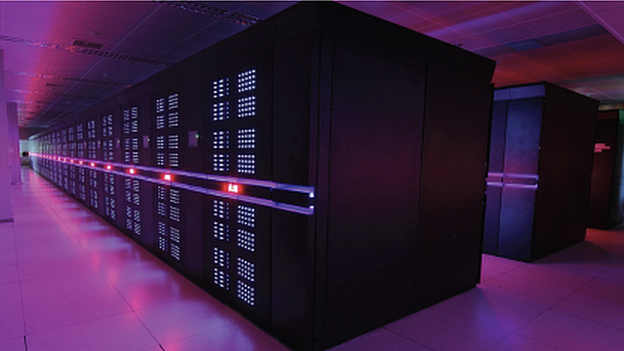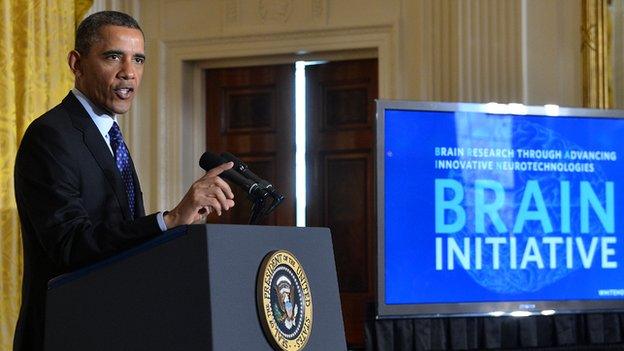Billion pound brain project under way
- Published
- comments
The BBC's Fergus Walsh: "Some doubt whether this project will justify its billion pound price tag"
A 10-year, billion pound neuroscience project which aims to revolutionise our understanding of the human brain has begun.
Scientists from 135 institutions, mostly in Europe, are participating in the The Human Brain Project, external (HBP).
Co-funded by the EU, it aims to develop the technology needed to create a computer simulation of the brain.
It will also build a database of brain research from the tens of thousands of neuroscience papers published annually.
Cognition
"The Human Brain Project is an attempt to build completely new computer science technology that will enable us to collect all the information we have built up about the brain over the years," said Prof Henry Markram, Director of the HBP at EPFL (Ecole Polytechnique Fédérale de Lausanne), in Switzerland.
"We should begin to understand what makes the human brain unique, the basic mechanisms behind cognition and behaviour, how to objectively diagnose brain diseases, and to build new technologies inspired by how the brain computes."
The scientists involved accept that current computer technology is insufficient to simulate complex brain function. But within a decade, supercomputers should be sufficiently powerful to begin the first draft simulation of the human brain.
Another hurdle is the huge amount of data that will be produced, which will mean massively expanding computing memory.
Complex
The HBP can be viewed as the neuroscience equivalent of the Human Genome Project, which involved thousands of scientists around the world working together to sequence our entire genetic code. That took more than a decade and cost hundreds of billions of dollars.
But whereas that involved mapping every one of the three billion base pairs found in every cell that make up our entire genetic code, the Human Brain Project will not be able to map the entire human brain. It's simply too complex.
Prof Henry Markram, director of the Human Brain Project
The brain has around 100 billion neurons, or nerve cells and 100 trillion synaptic connections.
Instead the project aims to build a variety of computer simulations.
Scientists at the University of Manchester are building a model which will mimic 1% of brain function. The SpiNNaker project is led by Steve Furber, a pioneer of the computer industry, who played a key role in the design of the BBC Microcomputer.
"I've spent my career building conventional computers and I've seen their performance grow spectacularly.
"Yet they still struggle to do things that humans find instinctive. Even very young babies can recognise their mothers but programming a computer to recognise a particular person is possible but very hard."
Neuromorphic computers
The scientists believe unlocking those secrets would yield major benefits in information technology, with the advent of so-called neuromorphic computers - machines which learn like the brain.
"With this knowledge we could produce computer chips with specialised cognitive skills that mimic those of the human brain, such as the ability to analyse crowds, or decision-making on large and complex datasets," said Prof Markram.
These digital brains should also allow researchers to compare healthy and diseased brains within computer models.
Brain disease
A key aim is to produce a more scientific understanding of the basis of brain diseases, building a unified map of neurological disorders and how they relate to each other. The HBP team believe that will help provide a more objective way to diagnose disease and treat brain disorders.
The massive cost of the HBP has attracted some criticism that it may starve funding for other neuroscience research. The vast ambition of the project has also led some to doubt whether it really can deliver a revolution in our understanding of the brain within a decade.
But Prof Steve Furber believes it is the right time to make the attempt: "There are plenty of grounds for scepticism about whether the project will deliver a fairly complete understanding of how the brain works. But we will make progress even if we don't achieve that ultimate goal and that could yield major benefits for medicine, computing and for society."
- Published17 June 2013

- Published27 May 2011
- Published2 April 2013
